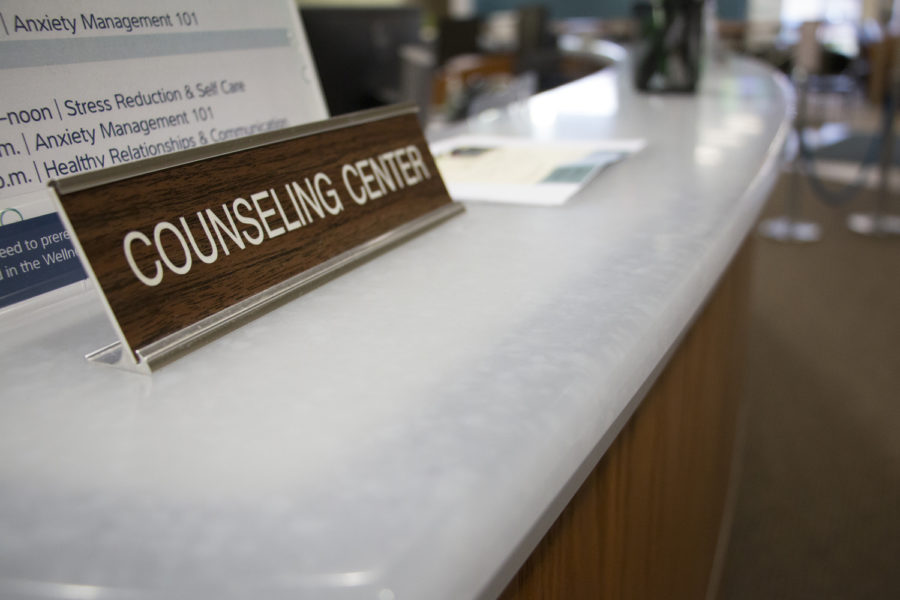Counseling Center adds staff, puts counselors in residence halls
Issi Glatts | Senior Staff Photographer
Starting in October, counselors will be available for consultation sessions in Sutherland Hall, Lothrop Hall and Towers Lobby.
September 24, 2019
Starting in October, the Counseling Center will place counselors in three residence halls on campus, allowing students to meet for informational consultations closer to home.
The new counselors will be in Towers Lobby, Sutherland Hall and Lothrop Hall and are one of the biggest changes that Counseling Center Director Jay Darr has made this fall. Placing counselors in residence halls is an expansion of the center’s “Let’s Talk” consultation services, which seek to bring counselors to students instead of the other way around.
In Lothrop, Darr said, the counselors will be located behind hall security, but in Towers and Sutherland, any student will be able to talk to a counselor without swiping in, similar to the current drop-in setup in the Wellness Center.
Darr, who was hired in January, is looking to make other changes as well. In an effort to address increasing demand, the Counseling Center has hired several additional staff members in the past few months. Darr said that in October, there will be 24 senior-level staff members as well as 11 master’s- and doctoral-level trainees. In April, the staff consisted of 20 clinicians and seven trainees.
Right now, Darr said, the Counseling Center has no wait list — something students have complained about in the past.
“I think over time, as the needs increase — there’s been a 30% increase in demand — the Counseling Center has been diligently responding to that over time, with some success, and sometimes it’s been challenging,” Darr said.
Eric Macadangdang, who sits on the Student Government Board and has worked on mental health initiatives in the past, called the plan to put counselors in residence halls “a great first step.”
“The symbolism of putting counselors where people are living shows that this is important, and I hope that, first of all, people notice it, and then [that] people utilize it,” Macadangdang said.
When Darr was hired in January, the Counseling Center’s director position had been empty for more than a year. Shortly after he took the position, Darr met with various student leaders and held a town hall to hear students’ concerns about the center.
“One of the things I did when I initially came on board was a listening tour,” Darr said. “Not only here internally, but also with students across campus — student leaders and other student groups — to be able to hear their feedback and what we can do to improve.”
The Counseling Center has been making an effort to partner with many different organizations, student-run and otherwise, in order to provide better self-help tools for students.
One of the programs, TAO Connect — “Therapy Assistance Online,” accessible from the Counseling Center’s website — provides access to both educational and therapeutic modules concerning depression, anxiety and other issues.
“We included that technology because we really felt that by empowering students, by creating autonomy in their lives for their support in mental health would be beneficial,” Darr said.
Another student that spoke with Darr was Julia Lam, the president of Pitt Active Minds. At Pitt, Lam runs a chapter of the national non-profit organization that organizes events, programming and peer education, but also seeks to provide a safe space for students to talk with their peers about what they’re going through.
Lam said that she liked the self-help aspect of TAO. According to Lam, TAO builds students’ independence and makes the process more interactive by giving students something to try out first on their own.
“One time [Darr] said that if you sprain your ankle, sometimes you don’t go directly to the doctor. You might try icing it yourself, or wrapping it in Ace wrap,” Lam said.
It’s important to remember that TAO is just a first step to try before moving on to higher levels of care, Lam said, and that students can go to the Counseling Center if they need more help.
The Counseling Center is also partnering with ThrivingCampus, which Darr said is another technological tool for students to take initiative on their mental health themselves. Students can use ThrivingCampus to look up unaffiliated community providers in the area, and they can adjust their results based on their insurance. Providers who aren’t accepting patients won’t be listed.
“With ThrivingCampus, they have to go through Pitt to be listed, so it’s Pitt-approved people,” Lam said. “When I’ve been looking at it recently, it seems like they’re still kind of spreading the word about ThrivingCampus, so there’s not as many providers on it yet. But I think once more private therapists get word of it then there’ll be a bigger pool of people to look through.”
Overall, Darr said he hopes to provide a more accessible and personalized form of care for students going forward that can give each and every individual student the care they need. The increase in demand is positive because it means that students are seeking help, he said.
“We just have to get smarter in how we begin to manage that demand and really meet the students where they are,” Darr added. “Instead of just saying ‘Here, everybody gets a cookie-cutter-type process,’ it’s really personalized to meet the students’ needs.”
An earlier version of this article incorrectly referred to ThrivingCampus as Thrive on Campus, an unconnected program.



